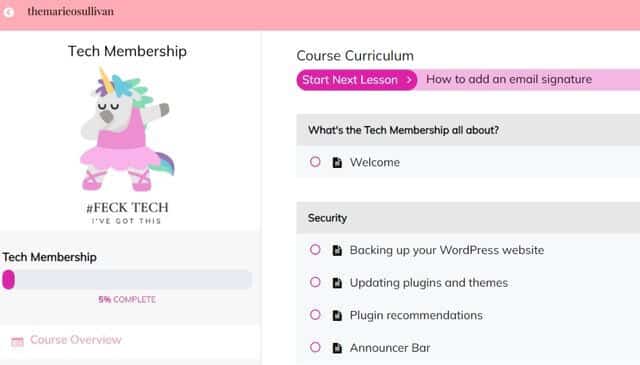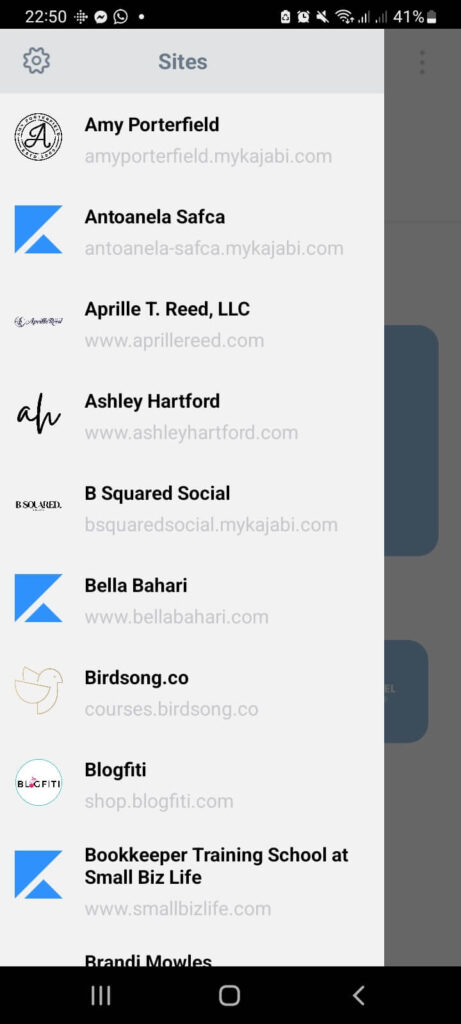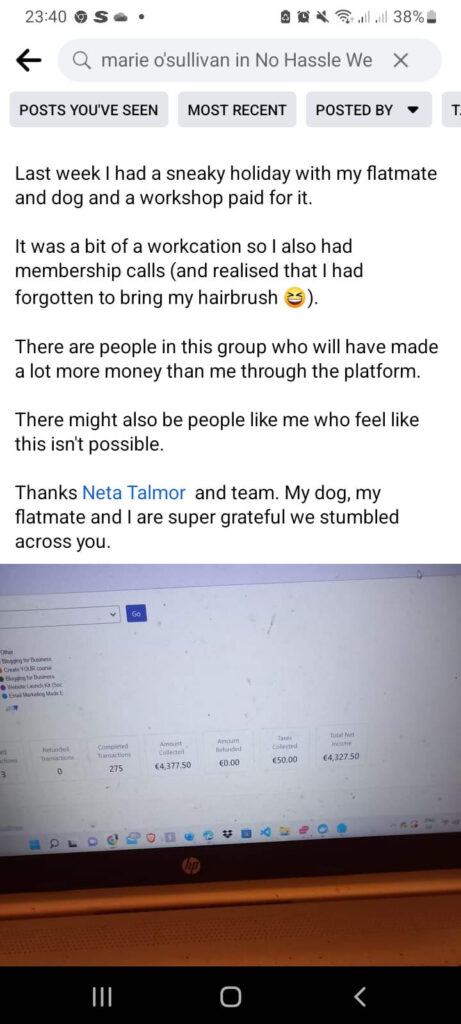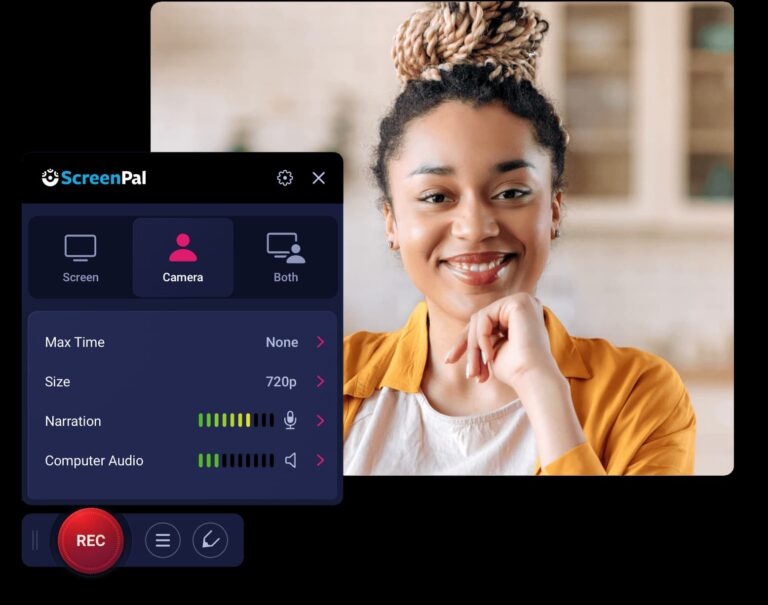If you’re reading this, you might be half-thinking about starting an online course or membership and wondering about how to select the right online course platform.
Here’s the bad news – the “perfect” online course platform doesn’t exist! The good news is that there undoubtedly is a course platform that is perfect for YOU 😉.
Now we’ve got that little disclaimer out of the way, let’s think about how you can make an informed decision to choose a course platform that’s a good fit for you and your business model.
What I'll cover
Why am I qualified to advise you on choosing a course or membership platform?
I am very far from being a millionaire or a “6-figure” entrepreneur. But I think I have earned my stripes to write this post because I have made a respectable few thousand euros over the last few years running courses and memberships in my own business – some live, some self-study, some hybrid (a mix of pre-recorded videos and live Q&A calls).
I’ve also saved countless clients a lot of stress, time, money and energy by helping them choose the right course platform and advising on the essential equipment they need to set up their courses and memberships.
I’ve created and facilitated my own CPD courses (that made a very respectable sum that was definitely not to be sniffed at) for an online course provider.
I’ve also advised clients on creating CPD courses, helping them map their courses and get a handle on the tech.
I’ve built a fair few courses for clients, covering everything from choosing the right course platform, outlining their courses, creating their course assets (pdf workbooks, slides, lesson transcripts, video captions), structuring their lessons, integrating payment systems, automating their emails, building sales pages, evergreen funnels, webinars, etc. I’ve also guided them through how to record their videos and where to host their videos.
The number one problem I’ve noticed is that coaches often get advice on choosing a course or membership platform from other coaches, who don’t always know all the options or the best tech solutions.
This post is my attempt to help you make an informed decision to choose the best online course platform for you, I’ll recommend a couple of options, but my main hope is that you have the knowledge you need to ask good questions so you’re going in with your eyes open.
Disclaimer: Some of the links on my website (marked *) are referral links, which means, at no additional cost to you, I may earn a small commission if you click through and make a purchase. I only ever recommend tools that I use myself and love.
You don’t need a big audience to sell a course (despite what others might tell you)
I’ll be honest, the first time I created a course for my own business I felt pretty scared and wondered why on earth I had the audacity to think I might have something valuable to share with others.
But 2024 me is pretty grateful to past me who believed in herself enough to risk it.
Let’s rewind – I had no email list, and no audience (apart from my darling dog). But what I did have was experience, a very strong desire to help others and nothing to lose…
In 2021 I ran a couple of courses and it worked out pretty well…even though I didn’t have the most auspicious start…


Make recurring income (without having to do a big launch)
I’ve also got recurring income from my #fecktech Tech Membership, a small and friendly group that I really enjoy running. It’s a community of coaches and therapists (and a lovely accountant) who hang out together every week, having a bit of a laugh and moving our businesses forward. We encourage each other to get to grips with techy things like setting up booking calendars, creating blogs and growing our email lists.
And in case you’re wondering, no I have never run a big launch. In fact, my Sales Page for the membership has been up for nearly a year and still has placeholder images on it because I keep “meaning” to edit it. What actually happens though is I’m more focused on helping my clients and haven’t gotten ’round to it!
Why you should just go for it if you’re thinking of starting a course or membership
Maybe you’re already second-guessing yourself and afraid to even think about starting a course or membership…
If so, can I just remind you…
People want to work with YOU. They care way less about your sales page than how you can help them. (Even though I’m a Web Designer and make money from creating beautiful sales pages, it wouldn’t be ethical for me to pretend that your sales page is what convinces people to work with you).
Take me for example – an introvert with a tiny audience who forgets to tell people about my things.
I am very selective about who I work with, I very rarely promote my membership and I have a pretty tiny audience, so I reckon that’s probably quite encouraging if you’re just starting out. I also want you to know that I’m a total introvert, hate the thought of conventional networking and have an allergic reaction to sleazy sales tactics. I’m absolutely not salesy – in fact I was recently told I share more about my dog on social media than my business 😊. And that’s the way I like to keep it.
(I sometimes feel like I’m doing marketing “wrong”, but I love that people come to me because of word-of-mouth referrals from happy clients).
I want people to work with me because I genuinely care about them, and I like having a small supportive community where it is safe for us to share and have a laugh.
I know I’m “supposed” to want completely passive income and chill on a beach drinking cocktails, but that’s not me. I like hanging out with my members and feeling like I’m really making a difference. I think it’s amazing that I can do that from home, with my little bichon joining in on our calls sometimes.
So if you are wondering if maybe you could earn some extra income running a course or membership that you love, I think you’ll like this post! I’ll talk about some of the limitations of different course platforms and what to look out for.
I’ll share the course platform I use myself, why I recommend it, who it’s a fit for and any other thoughts that you might find helpful.
The problem with choosing a platform is there are so many options it can feel overwhelming.
If you’re like a lot of my clients, maybe you’ve toyed with the idea of setting up a course or membership.
The problem is there are just so many options, and if you ask about the best platform in a Facebook group, you often get a range of answers, which is super confusing.
In this guide, I’m going to give you pointers for choosing the right course platform for you. Yes, I’ll absolutely share the course platform I use and why, but I’ll also give you a range of factors to think about so you can decide what’s the best fit for you.
By the end of this post, you’ll have all the knowledge you’ll need to feel confident in choosing an online course platform that fits your budget, your techy skills (or lack thereof!) and your plans for your business.
I’ll cover things you’ll need to research, the pros and cons of various platforms for your learners and for you as a business owner, platform features, costs, integrations and more.
What’s the difference between a course and a membership?
Before I get into choosing the right course platform though, I just want to make sure you’re clear on the difference between a course and a membership, because that might help you to decide which one is right for you…or if it’s not a fit for your business right now.
This post isn’t about telling you that you absolutely must have a course or membership platform. We all have different bandwidths, different needs and different business models. But if it’s something you’ve been thinking about or might be interested in in the future, I’d like to help by sharing my thoughts and experiences. I’ve been running my own courses and membership and I’ve helped clients to get cracking too.
This post isn’t about convincing you that there’s only one right course platform for you.
It’s to help you if you’re getting overwhelmed by all the different course and membership platforms out there and to share. an option you mightn’t have heard of and why I recommend it. But it’s also aimed at giving you a lens to look at selecting a course and membership platform and to share a possible option for you that’s budget-friendly.
What’s an online course?
An online course is a series of modules, containing lessons that have a defined beginning and end. It can be delivered by video, audio, pdf, etc. and it can be taught live and recorded or uploaded in advance. Or if you’re like me and love interacting with your students you might decide to run a hybrid course where you pre-record some content and also run live calls. (The beauty of having a hybrid model is that you’ll never be stuck for marketing content because you’ll know exactly what your right-fit clients are stuck on!)
Depending on the cost of the course, you might have a one-time fee or a payment plan. You might also offer early-bird pricing (a limited-time discount to encourage your audience to sign up).
What’s a membership?
A membership is an ongoing way of delivering training and the advantage for you as a business owner is that it’s a source of recurring income. You might use a course platform to host training (video, audio, pdf, etc). and also have a live element. Usually, your members will pay a monthly fee to access the content, or you might also offer an annual plan.
Spoiler alert – I have added every single thing I could think about to help you make an informed decision, sharing the pros and cons of various course platforms, but if you want to cut to the chase and just find out which one I actually recommend, it’s NoHassle course and membership platform, just click the link to skip to that bit if you like!
Questions to ask yourself when choosing an online course platform
Can I actually afford this?
How many spots would you need to sell to make the cost of investing in a course platform a sustainable choice? Depending on the provider you choose, the answer can vary wildly!
Some course platforms are more expensive than others – for example at the time of writing Kajabi’s basic plan is $199 dollars a month and it’s billed annually. That’s a big upfront investment if you’re just dabbling in starting a course or membership.
(Keep reading and I’ll share a much more affordable option that I use, love, and recommend).
Another thing to think about when it comes to investing in a course platform is whether the plan you are purchasing will allow you to grow in the future – make sure to check how many courses or memberships you can host with the basic plan before you have to upgrade to the next pricing level.
Many of my clients started out with a course platform that didn’t grow with them.
Think carefully when choosing a platform
If you start out on a platform it can be a gigantic pain to move to another provider, so please do think carefully before choosing where your course or membership is going to live.
- Ask yourself – is it going to be hard for me to keep up the payments if it doesn’t take off as quickly as I’m hoping it does?
- Is there good support available? For example, is there an active Facebook group, can I put in a ticket if I get stuck? Are there video tutorials to walk me through setting up my course or membership? Do I know someone who is using the platform so that if I get stuck I can ask for help?
- Is the platform stable? Be mindful that if someone is an affiliate for a certain platform and stands to make a big commission they may not have your best interests at heart!
- Does it have too many bells and whistles? Is it so complicated that I’m overwhelmed?
- Is it an all-in-one solution? And what happens if it goes down? Would it be better to keep my email service provider separate so I’m not reliant on one platform?
- What features would I like my chosen platform to have (now and in the future)? How many courses or memberships can I have at the price point that fits my budget? Do I need separate video hosting? How techy do I need to be to set this up?
- Payment integrations – Can people pay me using Stripe or PayPal? Can I add users manually if they pay me into my business bank account?
- Am I happy with the ethics of the course platform? (Some course platform owners have murky backgrounds and support political causes you may not align with and would never knowingly support!)
Pro Tip
Payment processors like Stripe and PayPal charge you a processing fee. When someone pays you through Stripe, you don’t get the money immediately – it can take seven days to land in your bank account – important to be aware of when you’re planning your cash flow.
Be wary of “free” course platform plans
Pro Tip
Some course platforms charge you a transaction fee – a percentage of each course sale you make, and these fees are often higher if you’re on their basic plan. (My provider of choice doesn’t though!)
For example, Teachable offers a free plan, but it’s very limited – you can only host one course and they’ll charge you $1 and 10% of your course price each time you make a sale.
Thinkific’s free plan offers you a 0% transaction fee, meaning you don’t have to pay them every time you make a sale. If you like Thinkific and decide to upgrade to the next plan so you can host unlimited courses, it works out at $36 a month.
Is it a one-off cost to me or is it a recurring payment?
Read the small print when choosing a course platform. More than likely you’ll have to sign up for a recurring payment plan to host your course or membership.
If you want to avoid recurring fees, you might be interested in finding out more about Thrivecart, because it offers a lifetime deal. That means that once you pay upfront for the platform it’s yours and you don’t have to keep paying. The disadvantage is that the lifetime deal is $690, which might be prohibitive depending on the stage of business you’re at.
You may also need to invest in video hosting – a place for your videos to live. (If you need an affordable option, I highly recommend ScreenPal’s Solo Premier plan *).
Do I need features like a quiz or a certificate of completion, or are those things just nice-to-haves? (For example, if you are creating a CPD course you’ll probably need to be able to track course completion and that participants have attained a certain level of knowledge).
I have seen clients pay for a platform for a couple of years without ever getting their course launched because their chosen platform is so complicated they resist it. I’ve also seen people invest in a really expensive platform because that’s what everybody else is using, it’s the one they’ve heard about and they don’t even know there are other options out there.
That doesn’t have to be YOUR experience. Choose a platform that is well-supported and that has step-by-step tutorials to ensure your course or membership gets launched and starts making you money.
Check Reviews
There’s no harm in checking reviews to see what others think about a course or membership platform that you have in mind. Research potential pitfalls, limitations to the platform and what the user experience is like.
For example, I personally find Kajabi a bit overwhelming as a course participant, because when I use the app on my phone it shows me all the different courses I’ve signed up for (quite a few because I love learning!).

I often get distracted and start looking at another course that I’ve and forget all about the one I intended to access. As a course provider, that’s something to bear in mind, because you want your clients to stay focused on what YOU offer.
Thrivecart is another platform that can be annoying as a course participant because if users have signed up for multiple courses from different providers it can be finicky to log in if you have different passwords for each course. (Ask me how I know…)
Identify User Preferences
When selecting an online course platform, it is important to start by knowing the people you want to help. Knowing what your users expect and need from the platform will help you make the most informed decision. Here are some of the key questions you should consider when selecting an online course platform:
1. What type of content do my users need? Video? Audio? Pdfs? Knowing what type of content your users will consume will help you choose the right platform.
2. What features must the platform have? Does the platform need features such as discussion boards, quizzes, or analytics? It is important to identify which features are essential to your users so you can select the right platform that works for them.
3. What devices will the users view my content on? Will they be using desktops, tablets, or mobile phones? Knowing which devices your users will use will help you select a platform that is compatible with their devices.
4. What level of technical expertise do my users have? Do they require a platform that is highly intuitive and easy to use, or are they comfortable with a more complex platform? Knowing the technical proficiency of your users will ensure you select a platform that fits their needs.
By taking the time to identify your user preferences, you can make a more informed decision when choosing the right online course platform for your users.
Compare Platform Features
This means thinking about what you need from a course platform and what your course participants need too.
So for example, a platform that offers a trial period could be helpful for both you and your audience because it gives participants a chance to get a taste of the magic of what you do AND you get paid.
Coupons are a handy feature because it means you can offer discounts to your email list or give them as a thank you to loyal clients.
An all-in-one platform like Kajabi or Kartra can sound very attractive, but the problem is if they change their terms and conditions to be less favourable, or if for some reason there’s an issue with the platform, you’ll find yourself compromised and it’s more difficult to leave and choose a more suitable provider.
Ideally, the platform you choose will be able to handle one-off payments, recurring payments (for memberships) and payment plans.
Some nice-to-haves are things like quizzes or the ability to give affiliate payments to members who promote your courses.
Check if you can brand your chosen platform to match your business – can you add your logo, fonts, and colour palette?
No Hassle Course and Membership Platform
I wholeheartedly recommend and am a proud affiliate of the NoHassle course and membership platform. (Please note that this isn’t an affiliate link, but if you tell them I sent you they will give me a small amount of “thank-you” money and it won’t cost you any extra).
If you choose to go with No Hassle as your course platform I’d be delighted if you tell them that you heard about the platform from me as it means I get a small thank-you fee at no additional cost to you.
I have been using and recommending NoHassle since 2018 and they only offered an affiliate programme last year, so please know that I would 100% recommend them even if there was nothing in it for me.
Here’s why I recommend the No Hassle Course and Membership:

It’s extremely affordable – the platform costs $99 (one-off fee) plus $150 annually and for that price, you can host unlimited courses and memberships. In addition, if you host your platform with Nohassle, you’ll pay about $9 a month or you can pay the annual fee in full.
They also give you 6 months of free hosting to give you a chance to start earning money, which is unbelievable value if you’re a small business owner. There’s a learning curve if you’ve never created online courses before, and having free hosting for the first six months gives you a chance to figure out the course platform and get the hang of its key features.
The platform is built using a plugin called MemberPress , an amazingly powerful tool that allows you to control who accesses your content and gives you a host of features that cost way more when you host your courses with other providers.
Fantastic support – there are step-by-step video tutorials to help you set up your course or membership. There’s a thriving Facebook group where you can pop any queries. Neta and her team also offer a responsive ticketing service where you can access additional support and hear back from a real human quickly. I’ve often submitted non-urgent tickets and heard back, with a personalised video that solves my problem way quicker than expected. Please don’t underestimate the importance of support when you’re trying to figure out how to select the right course platform.
There’s no need to pull your hair out when you’re stuck on something. Neta, the owner, specifically tells you to give something a go for 15 minutes and if you’re still stuck, she recommends that you just put in a ticket so that you don’t feel frustrated. Selling online can be easier than you think when you have access to support.
If there’s something I can’t figure out myself I often just search the Facebook group because more than likely someone else has been stuck on it too. Often I don’t need to put in a ticket because I can find the answer in the group.
Add your own branding – brand your course or membership to match your business by adding your logo, your photo, your hex codes and your fonts.
No design skills required – you can build a beautiful course using the page templates that have already been designed for you. That means you just have to add your content. Simply add your text, images, videos, PDFs, and whatever content your students need. As a bonus, you also get No Hassle Funnels – gorgeous landing pages to help you promote your offer.
Coupons/early bird/payment plans/trial: It’s simple to create coupons, give an early bird discount or give people a month’s trial of your offer. That means that it’s an easier “yes” for someone who is new to your world to pay you! You can also create payment plans for your bigger offers and create recurring subscriptions for your membership.
Automated payment plans: this means that if someone signs up for your membership, you don’t have to chase them every month for their membership fee – the platform follows up for you. I can’t get over the peace of mind that comes from having a predictable recurring income every month.
Quiz plugin: Easily create a quiz to help your users get the most out of your membership. The quiz can help users to choose their own adventure when it comes to your membership content. Use the quiz to direct them to the training they need at the level that’s right for them.
By following these tips, you can find the perfect online course platform for you and your students. With a quality platform in place, you can ensure that your students get the most out of their online learning experience.
And if you’d like a community that comes with a course platform, check out this review of Heartbeat, which I have been using to host my Tech Membership since January 2023.



Fantastic resource, thanks Marie!